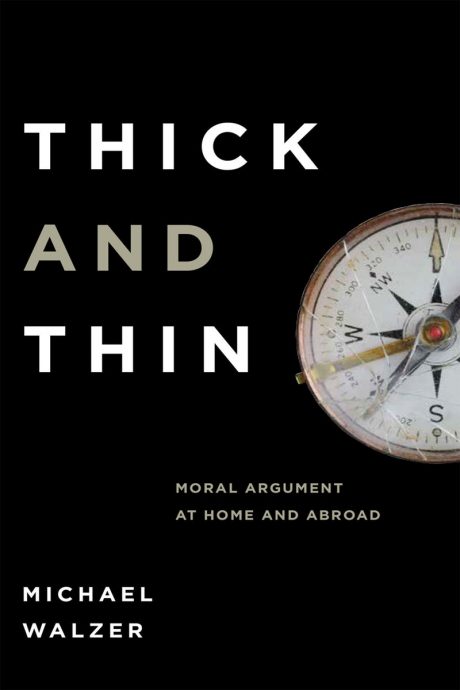Constitutional legalism is no panacea, but it is the best we lawyers can do.
Defending Liberalism through Thick and Thin
Michael Walzer’s Thick and Thin, first published in 1994 and now reissued with a preface and afterword, differs from many academic arguments in political philosophy. He does not seek a single, true comprehensive standpoint, but tries instead to respect the moral arguments that occur in different ways of life. His “commitment” is to “cultural autonomy and national independence.” He wishes “to endorse the politics of difference.” He himself thinks “it best to be governed democratically,” or indeed, socialistically, but he does not claim that his “political views have the definitive endorsement of God or Nature or History or Reason.” Yet, at the same time, he seeks to describe and defend a certain form of universalism. The result of his efforts is to claim that although central issues of distributive justice belong to different “thick,” histories and cultures, there is also a thinner “universalist” morality embedded within each of them.
“Thin” arguments are the areas of moral agreement among cultures. These agreements include objections to tyranny, oppression of the poor and brutality. This commonality allows us to understand others and to “march” with them against tyranny: the moral minimum does not stand alone, but rather designates “some reiterated features of particular thick or maximal moralities.”
Terms of Value
Walzer differentiates minimalism from a commitment to common procedures or common rules of discursive engagement of the sort promoted by Jürgen Habermas and his acolytes. Such rules are not universal but presume much of the thick substance of liberal or social democratic equality, in which “men and women. . . acknowledge each other’s equality, claim the rights of free speech, and practice the virtues of tolerance and mutual respect. . . .” Indeed, minimal moral agreement cannot replace defending “thickly conceived values.” “Social democracy, market freedom, moral laissez-faire, republican virtue, this or that ideas of public decency or the good life—all these have to be defended on their own terms.” These arguments will likely include the moral minimum but are not “derived from it.”
After describing his standpoint, Walzer turns to distributive justice to illustrate maximalist morality. His central point is that what constitutes a just distribution of social goods depends on a shared way of life. In liberal democracies, for example, we consider ourselves to be in charge of our individual plan of life. So, opportunities are justly or unjustly distributed in accord with this notion. “But, this is a historically specific and particular understanding of human life,” differentiated from inherited, socially regulated, spontaneous or divinely pre-destined lives: distributive justice does not have universal reach, but is connected to the goods distributed. In this regard, mere equality is a thin idea, “reiterated in almost every distributive system,” and useful in criticizing gross injustice (for example, racial discrimination) but not able to govern “the full range of distributions.”
Walzer then discusses “maximalism and the social critic.” The argument here and in his Spheres of Justice “that distributive standards are internal to a culture” does not preclude “radical social criticism” from within a culture. One can, for example, claim that one’s ideals are ineffectively enforced, held hypocritically or are inadequate. An actual example would be the critique within and of Czech communism; a hypothetical one would be an Egyptian scribe’s possible critique of some pharaoh. And, one can criticize from a minimalist standpoint, as, say Amnesty International does when it “embrace[s] for some specific purpose a moral minimum.” So, also, one might criticize American political life from a “thick account of democratic idealism,” focusing on “the invasion of the political sphere by wealthy individuals or by the masters of corporate wealth.”
Walzer then turns to issues of tribalism. “Self-determination for the many different kinds of tribes (nations, ethnic groups, religious communities) is . . . complicated,” but “there is room for maneuver,” although there is “no single rule or set of rules that will determine the form of separation and the necessary constraints.” Neutrality toward tribes can work in the United States, but in general one must consider many possible arrangements: none is mandated by minimal justice. One important issue is the size of a group and the degree of its dispersion. “Every tribe within its own modest bounds . . . is the political equivalent of toleration for every Church and sect.” Federal checks when tribes are locally dispersed as well as international pressure can be useful.
The Divided Self
Walzer next discusses a notion of self that he believes is coherent with his argument. He calls this the divided self. We can understand the self to divide “itself among its interests and roles,” for example, one’s roles as parent and worker. We can also understand the self to divide “itself among its identities”—for example one’s identity as belonging to a “family, nation, religion, gender, or political commitment. And, finally, we can understand the self to divide itself “among its ideals, principles and values.” Much of our self-criticism is a thin relation of a universal to a particular. But, the self more fully “is a complex maximalist whole,” containing various elements of these three divisions, and not subservient to a single linear hierarchy by which it judges and criticizes itself. “The order of the self is better imagined as a thickly populated circle.” In general, there is no “single ideal thickness of the self . . . or single ideal thick society.” Nor, therefore, can there be an ideal match between them.
The new edition contains an afterword that concentrates on international matters. It is a “reflection” on Walzer’s arguments in his Just and Unjust Wars, as his second chapter was a reflection on his Spheres of Justice. If we take in the broader swath of history, it is the rules of war that best exemplify minimal morality.” All know the rules of war “based on the right to life and to self-defense,” even when they break them. It can be difficult to specify the collective subject of the right to self-defense, but the issue is discussed in “culturally non-specific” language. He claims the value of stopping massacres and of immunizing non-combatants is universally understood. This understanding is not merely Western, liberal or philosophical but, “appears in every religion and every high civilization.”
What can we say about these arguments? For one, I believe that Walzer is too sanguine about the universality of thin morality. Many cultures permit slavery, vile mistreatment of conquered enemies, and deep class or caste divisions. Walzer himself says in his new preface that “heretics, apostates, and infidels” can be victims of religious zealotry that is “open to a thin or universalist critique.” Can we, then, truly find within such “maximalist” religions a universalist moral ground? Walzer underestimates the degree to which reasoned argument against brutal practices, and, indeed, forceful imposition against them can be necessary. Such arguments and impositions do rest on some degree of common ground but it is insufficiently fertile to secure the minimal morality he has in mind.
One needs, rather, to argue that a root inviolability exists in each human being, which grounds decent or equal treatment. Necessity and violence mean that this decency is often more an aspiration than a reality. But without this judgment it is unclear that there is anything universal about Walzer’s thin requirements. Because what is universal is finally to be understood rationally, moreover, the teaching and existence of natural rights, which justifies thin morality most generally, is not merely one way of life among others, but has priority. Such a teaching does have the effect that Walzer recognizes of weakening the sway of other cultures, much as religious toleration does. But, liberal democracy is the least constricting of ways of life. Indeed, unless an argument exists that protects and fosters individual rights in the United States, we could easily go the way of our own tribalism, where identities or groups of them clash and seek favor, often in real or pretended ignorance of the wealth and freedoms our country has brought them.
Tribes and Cultural Difference
It is also the case that “thick” cultures are not impervious to ranking, however much we respect cultural differences. This ranking is fundamentally in terms of human powers, their fullest use and the areas and opportunities that allow this. Views of what is good and just vary culturally and politically as does the substance of what we be distribute. But, we must be able to compare and evaluate these notions. How else could one defend improving others, or escaping from the stultifying practices into which one may have been born? One needs to be clear about the degree to which one indeed believes it proper that other cultures should rightly be transformed in many of their institutions, without always advocating that we should do this in practice.
Connected to these points is Walzer’s ambiguity theoretically about the object of his discussion: what are “cultures,” ways of life, ethnic tribes, religions or peoples? Are they identical? This ambiguity is significant because different kinds of groups call forth different degrees of loyalty, permit different degrees of focused, deliberate change and preservation, involve different kinds of relations of individuals to them, and enjoy different degrees of comprehensiveness or thickness.
Walzer’s notion of a divided self is useful. Still it is telling only for contemporary men and women who must choose among the complexities Walzer outlines rather than those who live within simpler ways of life. Moreover, he does not discuss the self’s powers but, rather, its engagements, and gives no guidance for choosing among these engagements. Walzer seems to treat the many identities as balancing out, which will not always be the case In liberal democracy, the rough edges are smoothed legally and through the principles we are taught—peace does not come simply from the large number of clashes.
Indeed, if individual opportunities and careers are liberal democratic but not present in many other cultural understandings, then the “individual” would also be differently understood in them, and would not always be grasped in terms of separate choice, reflection and action. In practice this would make class, ethnic and gender exclusivity likely because the individual or the equal individual would not be fully articulated as such. Some version of the liberal self needs to be not only described, but theoretically defended.
I do not intend these questions to detract from the many admirable qualities of Walzer’s work. He makes thoughtful suggestions for dealing with “tribal” and cultural differences. He seeks admirably to replace an approach to justice based on academic philosophers’ abstractions with a standpoint that respects political concreteness. He intelligently looks for ways to limit war, to find actual levels of agreement, and to step away from mere generalities. The reprinting and expansion of his challenging book is a welcome event.


